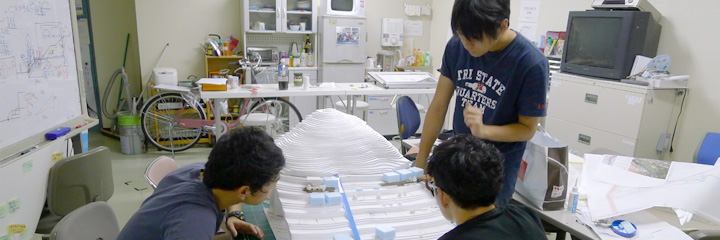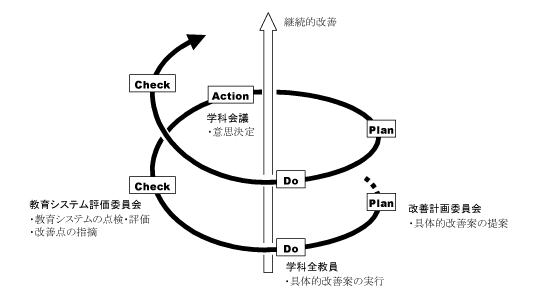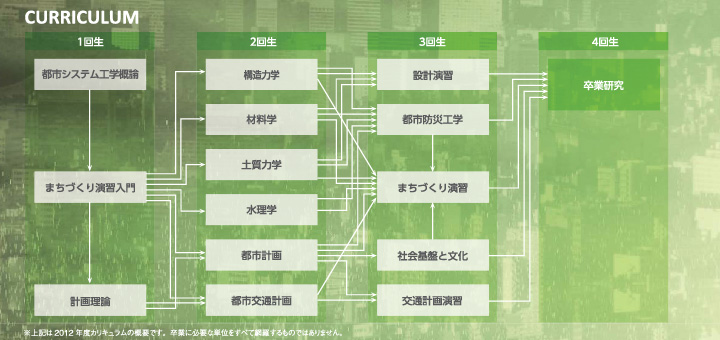Education Goals
- Provide training in sciences to enable students to understand science and technology as they relate to society.
- Foster academic abilities and information processing skills in the basic sciences of science and technology as well as information science.
- Facilitate acquisition of basic knowledge in a specialized field and the ability to independently solve problems.
- Foster the ability to understand the latest trends in science and technology and the communication skills to explain them.
- Cultivate interest in creating a social infrastructure that maintains an enriching living environment while protecting the global environment.
- Cultivate people who are capable of taking the lead in planning, constructing, and managing the social infrastructure.
- Cultivate the ability to understand human life and culture from a broad perspective.

Improving Education

Improving Education
The former Department of Civil Engineering is continuously examining and improving its education system.
We repeatedly implement the Plan-Do-Check-Act cycle to create a system that allows students to learn more effectively.
Plan
The Improvement Planning Committee devises specific policies for improving the education system. (Chairperson: Kazuyuki Izuno)
Do
All of the professors affiliated with the former Department of Civil Engineering implement specific improvements.
Check
An Education System Evaluation Committee evaluates progress on the improvements. It issues reports as needed, and identifies further areas for improvement. About once a year, the Expanded Education System Evaluation Committee, which includes some members from outside of the university, meets to evaluate and examine the education system from a more comprehensive perspective.
Action
Action is taken by a departmental conference comprised of all the professors affiliated with the department. This is the body with ultimate decision-making authority regarding education system improvements. (Department Chair: Hirosi Tsukaguchi, Educational Affairs Committee Member: Keiichi Ogawa)
We repeatedly implement the Plan-Do-Check-Act cycle to create a system that allows students to learn more effectively.
Plan
The Improvement Planning Committee devises specific policies for improving the education system. (Chairperson: Kazuyuki Izuno)
Do
All of the professors affiliated with the former Department of Civil Engineering implement specific improvements.
Check
An Education System Evaluation Committee evaluates progress on the improvements. It issues reports as needed, and identifies further areas for improvement. About once a year, the Expanded Education System Evaluation Committee, which includes some members from outside of the university, meets to evaluate and examine the education system from a more comprehensive perspective.
Action
Action is taken by a departmental conference comprised of all the professors affiliated with the department. This is the body with ultimate decision-making authority regarding education system improvements. (Department Chair: Hirosi Tsukaguchi, Educational Affairs Committee Member: Keiichi Ogawa)
Progress Evaluation
| Methods and standards for evaluating students' learning and achievement of education goals | ||
| Learning and Education Goals | Evaluation Methods | Evaluation Standards |
| Provide training in sciences to enable students to understand science and technology as they relate to society. | Confirm units completed at graduation | Completes the specified number of units (30 or more) of basic courses. |
| Foster academic abilities and information processing skills in the basic sciences of science and technology as well as information science. | Confirm units completed at graduation | Completes the specified number of units (26 or more) of specialized basic courses. |
| Facilitate acquisition of basic knowledge in a specialized field and the ability to integrate information and independently solve problems. | Confirm units completed at advancement to senior status or higher, confirm units completed at graduation | Fulfills the qualifications for starting their thesis research when advancing to senior status or higher. Completes the specified number of units (68) of specialized courses by graduation |
| Cultivate the ability to independently and continuously learn, and work in an ethical manner. | Confirm units completed at graduation | Completes the specified number of units (132). |
| Foster the ability to understand the latest trends in science and technology and the communication skills to explain them. | Confirm units completed at graduation, evaluate thesis research (including thesis presentation) | Passes the thesis defense after a full year of thesis research guidance. |
Curriculum



